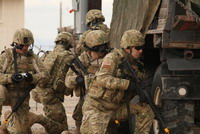America trains army of future
The U.S. Army of the future have to train foreign militaries, master other languages and customs, and hone its ability to fight smaller forces of insurgents.

In broad strokes, Gates laid out a vision for transforming the Army to a force better able to fight the type of unconventional warfare it has seen in Iraq and Afghanistan, which he said will "remain the mainstay of the contemporary battlefield for some time."
Speaking to the Association of the United States Army, Gates said the Army may also need to re-examine its policies for promotions and assignments to make sure the best and brightest officers - who have learned much over the past six years of war - stay in the service.
Success in future wars, said Gates, "will be less a matter of imposing one's will and more a function of shaping behavior - of friends, adversaries, and most importantly, the people in between."
Army and Pentagon leaders have warned repeatedly that the long, deadly and repeated deployments in Iraq and Afghanistan have stretched and stressed the Army, its soldiers and its families nearly to the breaking point. And there has been ongoing debate about how the service should transform itself to better meet the challenges of future wars.
Gates said that after the Vietnam War, the military spent little time training for irregular conflicts, leaving the Army "unprepared to deal with the operations that followed in Somalia, Haiti, the Balkans, and more recently, Afghanistan and Iraq - the consequences and costs of which we are still struggling with today."
In a recognition of the training and mentoring of Iraqi soldiers that U.S. forces are doing now, Gates said that "the most important military component in the war on terror is not the fighting we do ourselves, but how well we enable and empower our partners to defend and govern their own countries."
His call for a greater emphasis on learning other languages is a recognition of problems the military has had recruiting and keeping enough Arabic speakers. And he said that until other civilian agencies, such as the Agency for International Development, are strengthened, the military will need to take on many of the rebuilding tasks, as it has done in Iraq.
Pentagon leaders have repeatedly argued that as the Iraqi forces are able to take over the security of their own country, U.S. troops will be able to pull back and eventually head home. Once the focus of special operations forces, training foreign militaries now is a key mission for the U.S. military as a whole. And, determining how best to do that, Gates said, will require innovative thinking.
Another key challenge for the Army, Gates said, will be to continue to improve its technologies, while not losing the critical human element of intelligence gathering.
As an example, he pointed to the billions of dollars the military has spent trying to find the best way to deal with the wide range of roadside bombs being used in Iraq. Yet, he said, the best way to defeat these weapons "is to get tips from the locals about the networks and the emplacements" or to prevent the terrorists from planting them in the first place.
Gates' remarks came a day after Army Chief of Staff Gen. George Casey predicted the Army will be facing a protracted period of confrontation against a network of global extremists.
Gates said that while he believes the Army "is certainly not broken, it is under stress, and, as Gen. Casey recently put it, 'out of balance.' "
And Gates acknowledged that the Army has been underfunded in the past, and the government needs to provide enough money for personnel and equipment in the coming years.
"Resources are needed not only to recoup from the losses of the war," Gates said, "but to make up for the shortfalls of the past and to invest in the capabilities of the future."
Subscribe to Pravda.Ru Telegram channel, Facebook, RSS!


